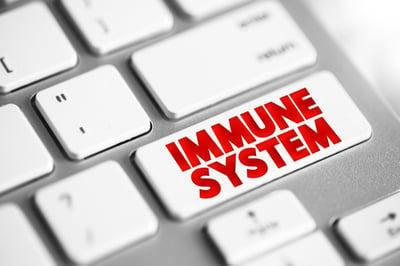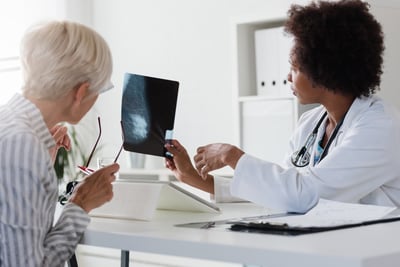Detrás de los titulares sobre el cáncer
Obtener más información sobre el programa de XRAY



Relevancia: Alta
Este artículo es de mayor interés para: Mujeres blancas y negras no hispanas con cáncer de mama
Estudio: La frecuencia de las mutaciones hereditarias relacionadas con el cáncer de mama es similar en mujeres blancas y negras
El estudio CARRIERS analizó la tasa de mutaciones hereditarias en mujeres con y sin cáncer de mama. En una ampliación del estudio CARRIERS, los investigadores no hallaron diferencias en la frecuencia de mutaciones hereditarias en los genes del cáncer de mama entre las mujeres blancas y negras con cáncer de mama. Unos pocos genes individuales diferían en frecuencia: Las mutaciones BRCA2 y PALB2 se observaron con más frecuencia en las mujeres negras, mientras que las mutaciones CHEK2 se observaron con menos frecuencia. Los investigadores concluyeron que la raza no debe utilizarse para determinar a quién se deriva a las pruebas genéticas. (Publicado el 13/8/21)
Leer más ›


Relevancia: Media-alta
Este artículo es de mayor interés para: Personas con cáncer de mama HER2- en etapa inicial y una mutación hereditaria en los genes BRCA.
Directrices: Las directrices de la ASCO recomiendan olaparib para personas con cáncer de mama en etapa inicial con alto riesgo de recurrencia y una mutación hereditaria en los genes BRCA
La Sociedad Estadounidense de Oncología Clínica (American Society of Clinical Oncology, ASCO) actualizó sus directrices sobre el tratamiento para el cáncer de mama al incluir tratamiento con el inhibidor de la polimerasa poli [adenosina difosfato-ribosa] (PARP, por sus siglas en inglés), olaparib (Lynparza), durante un año tras recibir quimioterapia, radiación o tratamiento quirúrgico (si se recurrió a éstas) para mejorar los resultados de las personas con una mutación hereditaria en los genes BRCA1 o BRCA2 con cáncer de mama HER2- en etapa inicial, con alto riesgo de recurrencia (publicado el 6/8/21).
Actualización: con base en los resultados del Estudio OlympiA, la FDA aprobó olaparib como tratamiento adyuvante para personas con una mutación hereditaria BRCA que han sido diagnosticadas con cáncer de mama HER2-negativo en etapa temprana y tienen un alto riesgo de reincidencia. (11/03/2022)
Leer más ›


Relevancia: Media-alta
Este artículo es de mayor interés para: Mujeres negras que viven en los Estados Unidos.
Actualización: Desigualdades por cáncer de mama en mujeres estadounidenses de raza negra
La Asociación Estadounidense de Investigación Oncológica (AACR, por sus siglas en inglés) publicó un informe en 2020 donde trata el tema de las desigualdades por cáncer entre los grupos raciales y étnicos de los Estados Unidos. En este informe se destacan los resultados sobre la carga del cáncer de mama en mujeres negras. (8/5/21)
Leer más ›


Relevancia: Alta
Este artículo es de mayor interés para: Personas con mutaciones hereditarias en el PALB2
Estudio: Riesgos de padecer cáncer en personas con mutaciones hereditarias en el gen PALB2
En el estudio de mayor tamaño realizado hasta la fecha en personas con mutaciones hereditarias en el PALB2, este gen se relacionó con un mayor riesgo de por vida de padecer cáncer de mama (hombres y mujeres), cáncer de ovario y de páncreas, pero no se relacionó con el cáncer de próstata o colorrectal. (publicado 1/7/21)
Leer más ›


Relevancia: Alta
Este artículo es de mayor interés para: Mujeres que padecieron cáncer de mama y están considerando el embarazo.
Estudio: Las mujeres pueden tener embarazos seguros después de haber recibido tratamiento contra el cáncer de mama
En un extenso análisis de todos los estudios publicados hasta la fecha, se presentan datos que respaldan que las mujeres que se sometieron a tratamiento contra el cáncer de mama han tenido embarazos seguros y no se ha observado un aumento en el riesgo de recurrencia. Los bebés de las mujeres que recibieron tratamiento contra el cáncer de mama eran más propensos a tener bajo peso al nacer, ser prematuros y tener un menor tamaño, pero no se observó un aumento en las anomalías congénitas. Las mujeres que se embarazaron después de haber sobrevivido al cáncer de mama presentaron riesgos similares de recurrencia y supervivencia que las mujeres que sobrevivieron pero que no se embarazaron (publicado el 24/6/21).
Leer más ›


Relevancia: Alta
Este artículo es de mayor interés para: Personas interesadas que tienen riesgo de padecer cáncer de endometrio, ovario o mama.
Estudio: Las pastillas anticonceptivas pueden ofrecer protección a largo plazo contra el cáncer de endometrio y ovario
Un extenso estudio mostró que las pastillas anticonceptivas pueden proteger contra el cáncer de endometrio y ovario, aún cuando las pastillas se hayan dejado de tomar hace varios años. (publicado el 1/6/21)
Leer más ›


Relevancia: Media
Este artículo es de mayor interés para: Personas con cáncer de mama triple negativo no metastásico con alto riesgo de recurrencia.
Actualización: La FDA autoriza las pruebas de una vacuna diseñada para prevenir el cáncer de mama
Durante años los científicos han trabajado para desarrollar una vacuna para prevenir el cáncer de mama. Recientemente, la Administración de Alimentos y Medicamentos (FDA, por sus siglas en inglés) anunció que se puede dar inicio al primer estudio clínico para probar la vacuna para prevenir este tipo de cáncer. Esta vacuna es el resultado de investigaciones que se han realizado durante más de una década en células de animales y personas. Los investigadores realizarán las primeras pruebas de la vacuna en mujeres que ya padecen cáncer de mama, pero esperan poder usarla en el futuro para prevenir esta enfermedad. (publicado el 25/5/21)
ESTA INFORMACIÓN SW ACTUALIZÓ el 12/10/2021: El ensayo clínico mencionado en esta publicación de XRAY ha comenzado a registrar participantes. Los investigadores esperan reclutar a 24 pacientes con cáncer de mama triple negativo no metastásico. Este ensayo clínico se está llevando a cabo en la Clínica Cleveland en Cleveland, Ohio. Para obtener más información sobre este ensayo, haga clic aquí.
Leer más ›


Relevancia: Alta
Este artículo es de mayor interés para: Personas con cáncer de mama, colorrectal o pulmonar.
Estudio: La ampliación del acceso a la cobertura de Medicaid estipulada en la Ley sobre la atención médica asequible está vinculada con la reducción de la mortalidad por cáncer
En 2014, la Ley sobre la atención médica asequible estipuló la ampliación de la cobertura de Medicaid. ¿Cómo afectó esto a los servicios de atención médica para los pacientes con cáncer? El presente estudio muestra que en los estados que ampliaron la cobertura de Medicaid se observó una reducción en las muertes por cáncer de mama, colorrectal y pulmonar en comparación con los estados que no ampliaron la cobertura. El diagnóstico temprano del cáncer está relacionado con bajos niveles de mortalidad. Estos datos indican que aumentar el acceso a la atención médica resultaría en un diagnóstico temprano del cáncer y mejores resultados, incluso en bajos niveles de mortalidad. (publicado el 31/3/21)
Leer más ›


Relevancia: Alta
Este artículo es de mayor interés para: Personas que consideren hacerse una mamografía después de vacunarse contra el COVID-19.
Directrices: El mejor momento para realizarse mamografías después de recibir la vacuna contra el COVID-19
Las vacunas contra el COVID-19 ayudan al sistema inmune a destruir el virus. Los ganglios linfáticos son un elemento importante del sistema inmune. Las vacunas contra el COVID-19 pueden provocar inflamación temporal en algunos ganglios linfáticos, lo cual puede suscitar sospechas en una mamografía. La Sociedad de Imagenología Mamaria (Society for Breast Imaging, SBI) y otras organizaciones profesionales han divulgado recomendaciones sobre el momento adecuado para realizarse mamografías después de haberse vacunado contra el COVID-19. (publicado el 30/3/21)
Leer más ›


Relevancia: Media-alta
Este artículo es de mayor interés para: Mujeres que están considerando una mastectomía sin reconstrucción del seno.
Estudio: Respuestas de pacientes y sus experiencias de “quedarse planas”
Algunas pacientes con cáncer de mama en fase inicial, o aquellas que están considerando una cirugía para reducir el riesgo pueden preferir una mastectomía sin reconstrucción, a lo cual suelen referirse como “quedar planas”. Los resultados de este estudio indican que los cirujanos desempeñan un papel central en esta decisión (publicado el 23/3/21).
Leer más ›